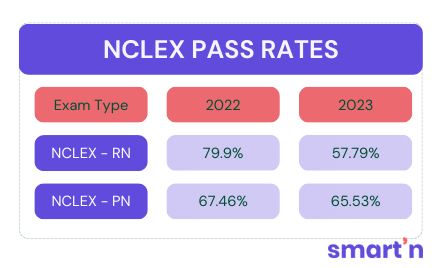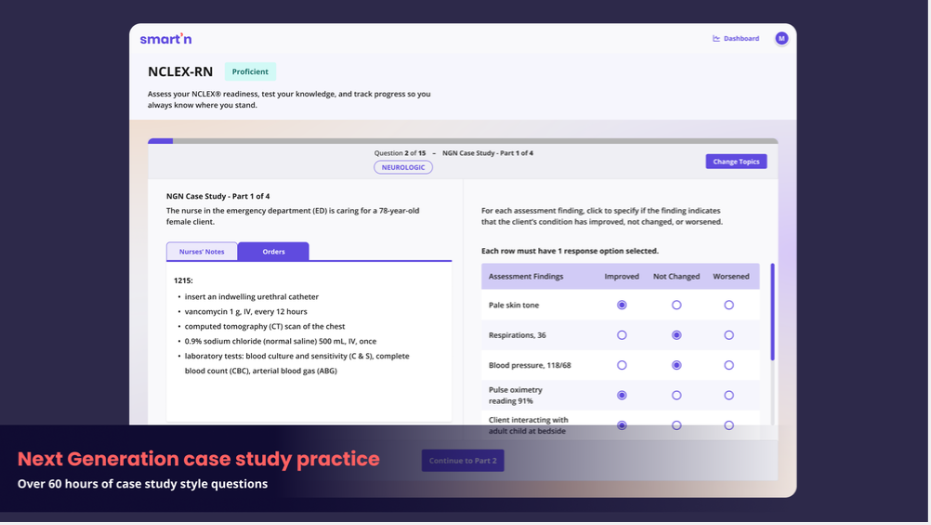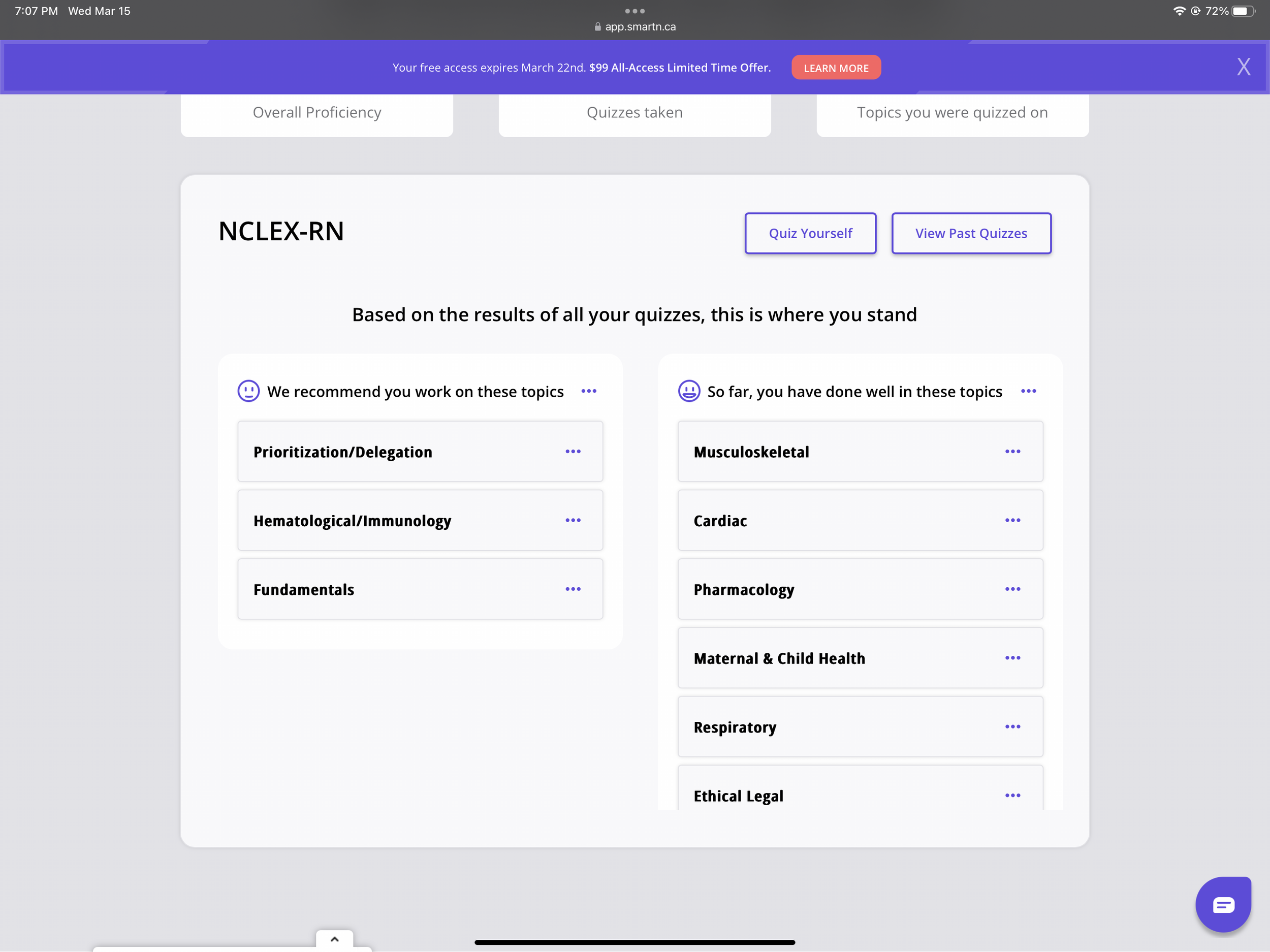Understanding Your NCLEX Test Results + Pass Rate Guide
The journey to becoming a registered nurse or licensed practical nurse doesn't end with completing your nursing program. One of the final hurdles you need to overcome is the NCLEX test. Once you've taken the nursing license exam, understanding your NCLEX test results becomes crucial.
In this guide, we'll explore the different aspects of the NCLEX test, how to interpret your results and provide insights into the pass rates. So, let's dive in and gain a deeper understanding of what your NCLEX test results mean.
Understanding NCLEX test results
Once you've completed your NCLEX exam, it's natural to be eager to know how well you performed. Understanding the nuances of NCLEX test results can provide valuable insights into your strengths and areas that require improvement.
NCLEX passing standard
The NCLEX test is not scored based on a percentage or a simple number of correct answers. Instead, it uses a computerized adaptive testing (CAT) method. The CAT system adjusts the difficulty of the questions based on your performance during the exam, aiming to determine your competency level with a high degree of accuracy.
Initially, you will encounter questions of moderate difficulty. As you answer them correctly, the system presents more challenging questions, testing your knowledge and critical thinking skills further. Conversely, incorrect answers lead to the presentation of less difficult questions.
Normally, you get a minimum of 75 questions and a maximum of 265 questions for the NCLEX-RN exam and between 85 and 205 questions for the NCLEX-PN exam.
The actual number of correct answers required to pass the exam may vary for each test-taker, as it depends on the difficulty level of the questions encountered. The goal of the CAT format is to determine with 95% confidence whether your ability is above or below the passing standard. Once this level of confidence is reached, the exam ends.
NCLEX scoring system
Unlike traditional exams, the NCLEX does not provide a numerical score or a percentage of correct answers. Instead, you will receive one of the following results:
Pass: Congratulations! This indicates that you have demonstrated the minimum level of competency required to practice safely as a nurse.
Fail: If you receive a "fail" result, it means that you did not meet the passing standard required for licensure. However, this does not imply that you lack the potential to succeed in the future. It is essential to review your performance and identify areas for improvement.
How long do NCLEX test results take?
After completing your NCLEX exam, you're likely eager to receive your test results and find out how you performed. The NCLEX result time varies based on the specific state board of nursing. Generally, it takes approximately 6 weeks to receive the official results after completing the NCLEX exam.
Candidates pursuing licensure in the United States, who want the quick results NCLEX before 48 hours, have the opportunity to view unofficial test results within two business days after completing their exam by using the NCLEX Quick Results Service option. They have to pay $7.95 for this NCLEX quick results time.
Interpreting NCLEX test results and CPR
Once you receive your NCLEX test results, you'll gain access to an exam Candidate Performance Report. The Candidate Performance Report (CRP) serves as a comprehensive overview of your overall performance on the NCLEX test.
It includes information about the number of questions answered, the percentage of questions answered correctly, and your pass/fail status.
In addition to the overall performance, the exam performance report breaks down your results by content areas.
It highlights your proficiency in each category, such as safe and effective care environment, health promotion and maintenance, psychosocial integrity, and physiological integrity. This breakdown allows you to identify areas where you performed well and areas that may require further attention.
By analyzing your performance in different content areas, you can gain valuable insights into your strengths and weaknesses. Understanding your strengths allows you to build upon them while identifying weaknesses helps you target those areas for NCLEX retake and additional study and improvement.
What does a passing NCLEX result mean?
Achieving a passing result on the NCLEX test opens up various opportunities in your nursing career.
1- Licensure eligibility
Passing the NCLEX is a prerequisite for obtaining a nursing license in the United States. Once you pass the exam, you become eligible to apply for licensure in the state where you wish to practice nursing. Obtaining your nursing license is a significant milestone on your path to becoming a professional nurse.
2- Job opportunities
Having a passing NCLEX result significantly increases your chances of securing nursing job opportunities. Many healthcare institutions require applicants to have passed the NCLEX before considering them for employment. A passing result demonstrates your competence and readiness to provide safe and effective patient care.
Understanding NCLEX pass rates
NCLEX pass rates refer to the percentage of candidates who successfully pass the examination within a specific timeframe. These rates serve as a measure of an educational program's effectiveness in preparing students for the exam and reflect the overall quality of nursing education.
The importance of NCLEX pass rates
Positive NCLEX test results and high NCLEX pass rates are essential considerations when choosing a nursing program. Institutions with consistently high pass rates demonstrate their commitment to providing students with the knowledge and skills necessary to pass the exam and enter the nursing profession confidently. By enrolling in a program with a strong track record, you increase your chances of success and ensure that you receive a quality education.
Factors influencing NCLEX pass rates
Several factors can influence the pass rates of the NCLEX exam. Understanding these factors can help you better prepare for the test and increase your chances of success.
- Educational preparation
The quality of your nursing education plays a crucial role in your readiness for the NCLEX exam. A well-rounded and comprehensive nursing program equips you with the knowledge and skills necessary to tackle the exam. It's essential to choose an accredited nursing school and program that prepares you adequately for the NCLEX.
- Test-taking strategies
Developing effective test-taking strategies is key to performing well on the NCLEX. Familiarize yourself with the exam format and NCLEX test plan, practice time management, and learn how to approach different question types. Utilizing strategies such as eliminating obviously incorrect answers, using critical thinking skills, and prioritizing client needs can significantly improve your performance.
- Support resources
Leveraging support resources can enhance your preparation for the NCLEX. These resources include review nursing school courses, study materials, NCLEX practice questions, and interactive learning tools. Utilizing these resources can provide you with a comprehensive and structured approach to studying for the exam.
- Self-preparation and study habits
Your personal dedication and study habits play a significant role in your NCLEX success. Consistency, discipline, and effective time management are crucial when preparing for the exam. Establishing an NCLEX study calendar, setting goals, and maintaining a focused and organized study environment can maximize your learning potential and help you retain information effectively.
- Clinical experience
Hands-on clinical experience during your nursing education can greatly contribute to your success on the NCLEX. Clinical rotations provide opportunities to apply theoretical knowledge, develop critical thinking skills, and gain practical exposure to patient care. The more diverse and extensive your clinical experiences, the better equipped you'll be to handle the practical scenarios presented in the exam.
Remember that each individual's journey and circumstances are unique. While these factors can influence NCLEX test results and pass rates, it's important to focus on your own strengths, weaknesses, and study needs. By identifying areas that require further attention, utilizing appropriate resources, and implementing effective study strategies, you can increase your chances of achieving a successful outcome on the NCLEX exam.
Strategies for excelling on the NCLEX
Now that we have discussed the factors influencing NCLEX pass rates let's explore some strategies to maximize your chances of success:
1. Develop a structured study plan
Creating a well-organized study plan is crucial for effective preparation. Identify your strengths and weaknesses, allocate time for different content areas, and set specific goals for each study session. Adhering to a structured plan will help you stay focused, cover all the necessary material, and monitor your progress.
2. Prioritize NCLEX-style practice questions
NCLEX-style practice questions are invaluable for exam readiness. Answering a wide range of practice questions will not only enhance your content knowledge but also improve your critical thinking and decision-making skills. Aim to practice questions from various content areas, focusing on both high-level and foundational concepts.
Smart’n: The ultimate resource for practice questions and case studies
Smart'n is a platform designed specifically to support nursing students in their academic endeavors. It provides a wide range of resources, including a vast collection of over 2,500 practice questions and more than 60 hours of NGN NCLEX-style nursing case studies.
Smart'n also offers continuous assessments and a comprehensive overview of students' performance. This valuable feature allows students to track their progress, identify their strengths, and pinpoint specific areas that require improvement.
3. Utilize high-quality study materials
Invest in reputable NCLEX review resources, such as textbooks, practice question banks, and online learning platforms. These materials are specifically designed to simulate the exam and provide a targeted NCLEX review. Make sure to choose resources that align with the latest test plan and incorporate evidence-based practice.
4. Engage in active learning
Passively reading textbooks is not sufficient for NCLEX preparation. Engage in active learning strategies, such as concept mapping, group discussions, and teaching others. Actively applying and explaining the concepts you learn will reinforce your understanding and enhance retention.
5. Practice time management
The NCLEX is a time-constrained exam, so developing good time management skills is essential. During your practice sessions, simulate the exam conditions by setting time limits for each question and section. This practice will help you become familiar with the pacing required to complete the exam within the allotted time.
6. Seek support and collaboration
Don't hesitate to seek support from peers, mentors, or online communities. Join study groups or online forums where you can share experiences, ask questions, and receive guidance. Collaborating with others can provide valuable insights and support your learning journey.
7. Practice self-care and manage stress
Taking care of your physical and mental well-being is essential during NCLEX preparation. Engage in regular exercise, maintain a healthy diet, get enough sleep, and practice relaxation techniques. Managing stress effectively will optimize your cognitive function and promote overall success on the exam.
Conclusion
Understanding your NCLEX test results is essential for your nursing career. By comprehending the intricacies of the exam, interpreting your results, and implementing effective strategies, you can increase your chances of passing the NCLEX and embarking on a successful nursing journey. Remember to focus on continuous learning, leverage available resources, and remain confident in your abilities as you prepare for this significant milestone.
FAQs
1. Can I retake the NCLEX if I fail?
Yes, if you fail the NCLEX, you can retake the exam. You can retake the NCLEX exam 8 times a year at 45-day intervals.
2. What does 75 on NCLEX mean?
Getting a 75 on the NCLEX exam indicates that you have passed the test by correctly answering the minimum number of questions required. This allows you to conclude your exam session promptly and alleviate any stress associated with the examination.
3. How many questions out of 75 do you need to pass the NCLEX?
In order to pass the NCLEX RN or PN, individuals must answer a minimum of 75 questions correctly.





